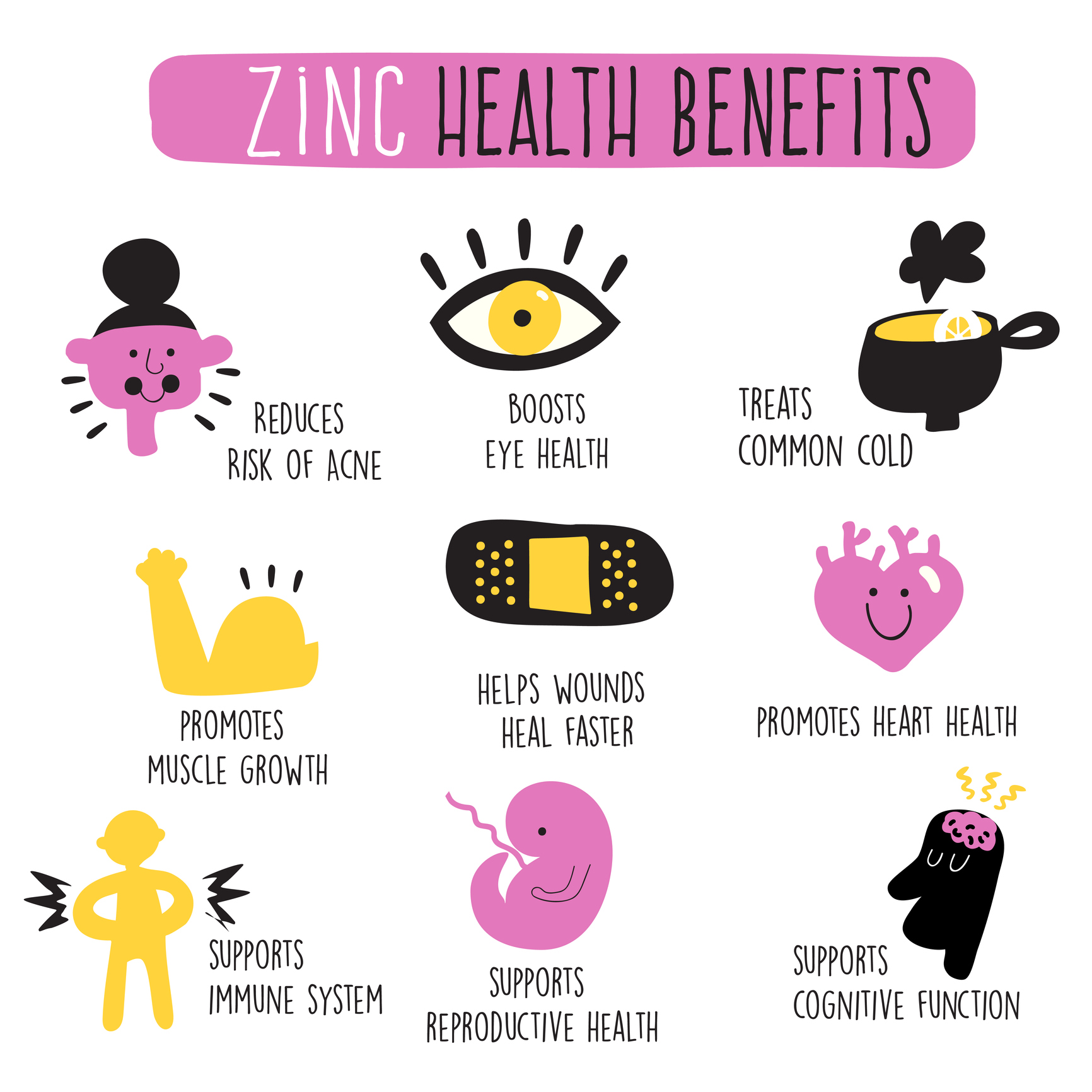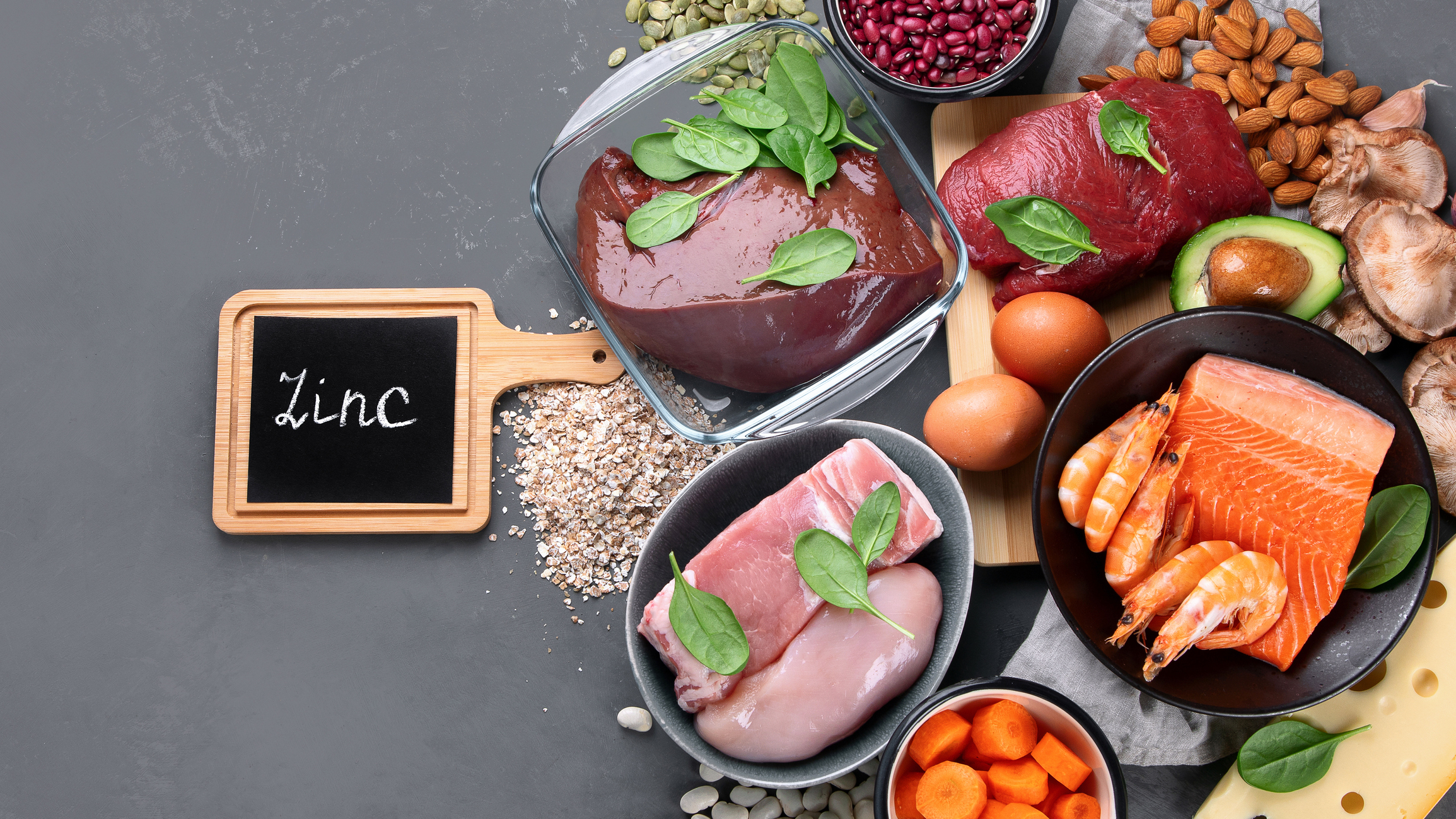- prolekare.cz - Effect of trace elements on the immune system
- skp-casopis.sk - Zinc and its important and irreplaceable role in dermatology and interdisciplinary medicine
- skp-casopis.sk - Zinc from a dermatologist's perspective II
- ncbi.nlm.nih.gov - Zinc Therapy in Dermatology: A Review
- researchgate.net - Zinc Therapy in Dermatology: A Review and Update
- researchgate.net - An overview of zinc and its importance in dermatology-Part II: The association of zinc with some dermatologic disorders
- ncbi.nlm.nih.gov - The Therapeutic Effect and the Changed Serum Zinc Level after Zinc Supplementation in Alopecia Areata Patients Who Had a Low Serum Zinc Level
- prolekare.cz - Analysis of Zinc and Copper Tablets in Polycomponent Mineral Supplements
- researchgate.net - The possible role of zinc in the etiopathogenesis of endometriosis
Why is zinc important in the female body? How to supplement it? + Effects

Zinc came to more people's attention during the COVID-19 pandemic. Do you know how important it is for women's health?
Article content
The following table shows the classification of biogenic elements
| Major biogenic elements |
|
| Electrolytes |
|
| Trace elements metals |
|
| Trace elements non-metals |
|
Zinc and its importance for the body
Zinc is an essential element for the proper function of most organs in the human body. It is a component of approximately 3,000 proteins, 300 enzymes, nuclear factors and hormones.
It is involved in a wide range of biological functions:
- Stabilizes and protects the integrity of cell membranes
- It is important for the proper functioning of the immune system
- Involved in the formation of proteins
- Contributes to wound healing
- Supports fertility
Did you know...
Zinc deficiency is the cause of the worldwide incidence of lower respiratory tract infections (16%), malaria (18%) and diarrhea (10%).
One of the most important roles of zinc is its effect on the immune system and the body's response to the inflammatory process. The immune system is sensitive to zinc balance.

Zinc deficiency is a danger signal for the immune system. The result is excessive and uncontrollable production of inflammatory mediators.
This process is in many cases the cause of skin diseases in women. Skin diseases are problematic in that they affect not only our exterior, but also our psyche.
Many women are concerned about their appearance. And any defect in appearance can cause psychological problems such as depression or feelings of inferiority.
Did you know...
There are approximately 2 to 3 grams of zinc in the human body. Approximately 60% of the total amount of zinc is found in the muscles. Approximately 30% is found in the bones. About 6% of the total amount of zinc is found in the skin.
In which skin diseases does zinc play a role?
- Enteropathic acrodermatitis (Acrodermatitis enteropathica)
This is a congenital disease that manifests itself in childhood. The cause of the disease is a mutation in the gene encoding one of the zinc transport proteins.
Symptoms appear a few days to weeks after the cessation of breastfeeding. This is because breast milk partially compensates for the zinc deficiency.
The manifestations of the disease include a triad of symptoms:
- deposits of dermatitis
- alopecia
- diarrhoea
Zinc is an important cofactor for several enzymes. Among other important roles in the human body, it is involved in important processes in the hair follicle. Specifically, it helps revitalize hair follicles.
Patients suffering from alopecia (a hereditary form of acrodermatitis enteropathica) are characterised by reduced zinc levels in their hair. The hair of these patients has a typical irregular pattern.
In a Korean scientific study, a reduced serum zinc level was observed in patients suffering from a form of alopecia areata. Several studies have confirmed the improvement of patients after oral zinc supplementation.
- Acne (Acne vulgaris)
It is well known that a diet deficient in zinc often worsens acne symptoms, especially on the face. Zinc has long been used in the treatment of acne. It can be used either topically or systemically.
In the treatment of acne, zinc acts by:
- anti-inflammatory
- reduces the number of Propionibacterium acnes colonies
- prevents thickening of the outer layer of the skin
In the case of combination of zinc-containing products with topical antibiotics, the following occurs:
- absorption of antibiotics is improved.
- reduction of adverse effects of antibiotics
- significant reduction in the development of resistance
Systemically administered zinc is mainly used in the treatment of moderate and severe forms of acne, either as an adjuvant treatment or as the drug of choice in patients with contraindications to other systemic treatments (age, pregnancy).
- Psoriasis (Psoriasis vulgaris)
The results of a foreign scientific study show that 0.25% zinc pyrithione cream (applied twice daily) is effective for localised plaque psoriasis. The therapeutic effect of zinc pyrithione is based on its antiproliferative effect.
Topical preparations containing zinc salts are used in the treatment of seborrhoeic dermatitis. Preparations containing zinc pyrithione are available on the market. This is characterised by its antifungal and keratolytic effect.

Zinc also plays an important role in the development of symptoms of atopic eczema. Consuming a diet deficient in zinc can trigger the symptoms of this disease.
Zinc supplementation in the treatment of the most severe forms of atopic eczema contributes to a significant improvement in the patient's condition. In many cases, the redness of the skin is reduced.
Viral warts are another skin disease in which, in addition to topical application of zinc, systemic administration is also used.
Although its systemic administration is not in the treatment recommendations for this disease, in many countries its supplementation is considered a standard part of treatment.
- Molluscs
Molluscum is mainly suffered by children. Given the age group affected by this viral disease, treatment should be painless but sufficiently effective with minimal side effects.
These conditions are met by topical preparations containing zinc (liquid powder, zinc ointment). To support the function of the immune system, it is recommended to take oral preparations containing zinc.
- Wound healing
Topical preparations containing zinc oxide are used in the treatment of arterial and venous tibial ulcers, decubitus ulcers and diabetic foot ulcers.
The anti-inflammatory and antibacterial action of zinc is particularly useful in the treatment of chronic skin ulcers.
For more information, see also the article:
What is zinc good for and what are its effects? Food sources and dosage
Zinc and women's reproductive health
Zinc is very important for the proper functioning of the reproductive system of both sexes.
It affects the following processes:
- Ovulation
- fertilization
- the normal course of pregnancy
- fetal development
- childbirth
- sperm development in men

Some processes in the female body depend on men. Therefore, let's first explain how zinc affects men's health.
In men, zinc maintains normal testosterone levels and male fertility parameters:
- sperm count
- sperm density
- sperm motility
- sperm morphology
- sperm viability
- semen volume
Zinc deficiency in men leads to impotence, hypogonadism or delayed sexual development.
In women, zinc supplementation is important in:
- Polycystic ovary syndrome (PCOS ) - affects insulin resistance (body cells do not respond to insulin due to the disorder) and lipid balance
- painful menstruation (dysmenorrhoea) - reduces the intensity of menstrual pain
- endometriosis - antioxidant effect helps prevent endometriosis
In addition to the diseases mentioned, zinc affects various processes in the female body. For example, it regulates the menstrual cycle, helps women's hormonal balance and promotes ovulation.
Main food sources
Important food sources of zinc include:
- red meat (beef, pork)
- poultry (chicken or turkey)
- seafood (oysters, crabs and lobsters)
- egg yolk
- vegetables (broccoli, garlic, cabbage)

How to take zinc?
The recommended dose for adults and adolescents (12 to 17 years of age) is 12.5 to 25 mg of zinc once a day.
For children (6 to 11 years), it is given once a day at a dose of 12.5 mg.
Tablets containing zinc should be taken with plenty of liquid. Water is the most suitable liquid.
Liquids such as:
- mineral water
- milk
- coffee
- caffeinated drinks
Medicinal products containing zinc should be taken fasting, or well in between meals. The most ideal time is half an hour before or 2 hours after a meal.
How does zinc deficiency manifest itself?
Zinc deficiency becomes apparent quite early if zinc intake is insufficient.
Zinc deficiency is manifested by:
- impaired wound healing
- poor growth
- impaired reproductive capacity
- delayed sexual maturation
- retardation
- irregular menstruation
- prostate enlargement
- psychological disorders
- learning disabilities
- mental memory disorders
- fatigue
- lack of appetite
- atherosclerosis
- poor blood circulation
- susceptibility to infections
- joint pain
Did you know that...
The highest prevalence of zinc deficiency is in the Middle East. This is due to the high consumption of cereals. Cereals contain phylates, which bind zinc and reduce its absorption.
The following groups of people are at increased risk of zinc deficiency:
- Chronic alcoholics
- children with low protein intake
- pregnant and breastfeeding women with poor diets
- patients on long-term parenteral nutrition

Zinc oxide is used in topical application forms. It is a component of liquid powders, fillings and pastes. It is used to treat acute and subacute dermatoses.
Zinc oxide has the following effects:
- astringent
- antiseptic
- drying
- antiviral effect
- promotes the healing process
- eliminates unpleasant sweat odour
- is a physical UV filter
Interesting resources
Related










